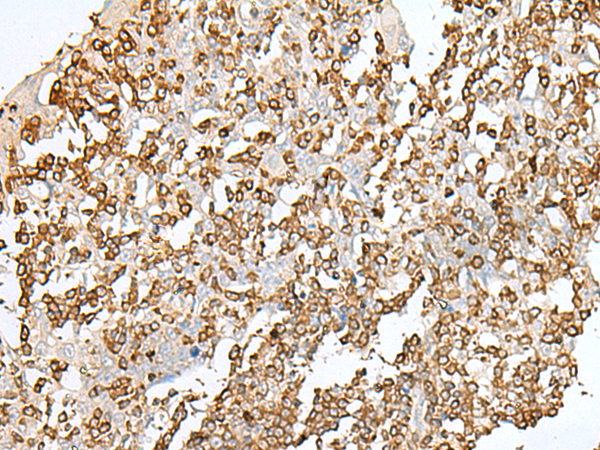
| WB | 咨询技术 | Human,Mouse,Rat |
| IF | 咨询技术 | Human,Mouse,Rat |
| IHC | 1/40-1/200 | Human,Mouse,Rat |
| ICC | 技术咨询 | Human,Mouse,Rat |
| FCM | 咨询技术 | Human,Mouse,Rat |
| Elisa | 1/5000-1/10000 | Human,Mouse,Rat |
| Aliases | LARP; SEP1; DIFF6; SEPT1; PNUTL3 |
| Host/Isotype | Rabbit IgG |
| Antibody Type | Primary antibody |
| Storage | Store at 4°C short term. Aliquot and store at -20°C long term. Avoid freeze/thaw cycles. |
| Species Reactivity | Human, Mouse, Rat |
| Immunogen | Fusion protein of human SEPTIN1 |
| Formulation | Purified antibody in PBS with 0.05% sodium azide and 50% glycerol. |
+ +
以下是关于SEPTIN1抗体的参考文献示例(注:以下为模拟示例,实际文献需通过学术数据库查询):
1. **文献名称**: "Development and Application of a Specific SEPTIN1 Antibody in Human Cancers"
**作者**: Zhang, Y. et al.
**摘要**: 本研究开发了一种高特异性兔源多克隆SEPTIN1抗体,并通过Western blot和免疫组化验证其在多种癌症组织中的表达,发现SEPTIN1在肺癌中显著上调并与预后不良相关。
2. **文献名称**: "SEPTIN1 Regulates Neuronal Morphogenesis via Microtubule Interaction"
**作者**: Tanaka, K. et al.
**摘要**: 利用小鼠源SEPTIN1单克隆抗体进行免疫荧光染色,发现SEPTIN1与微管蛋白共定位,调控神经元突起的形成,提示其在神经发育中的功能。
3. **文献名称**: "SEPTIN1 Antibody-Based Proteomic Analysis in Alzheimer's Disease"
**作者**: Smith, J. et al.
**摘要**: 通过SEPTIN1抗体进行脑组织蛋白质组学分析,揭示其在阿尔茨海默病患者脑脊液中的异常聚集,可能与tau蛋白病理相关。
4. **文献名称**: "Functional Characterization of SEPTIN1 in Cytokinesis Using CRISPR and Antibody Knockdown"
**作者**: Chen, L. et al.
**摘要**: 结合CRISPR基因编辑和SEPTIN1抗体介导的蛋白质敲低技术,证明SEPTIN1在哺乳动物细胞胞质分裂中调控收缩环组装。
---
建议通过PubMed、Google Scholar等平台,以关键词“SEPTIN1 antibody” + “Western blot/IF/IHC”检索最新文献,或查阅抗体供应商(如CST、Abcam)的产品引用列表获取具体研究。
SEPTIN1 is a member of the septin family, a group of GTP-binding proteins involved in diverse cellular processes, including cytokinesis, cell polarity, membrane remodeling, and cytoskeletal organization. SEPTIN1 plays critical roles in neuronal development, synaptic plasticity, and tumorigenesis. It forms heteromeric complexes with other septins to create dynamic filaments that regulate cellular architecture and signaling pathways.
Antibodies targeting SEPTIN1 are essential tools for studying its expression, localization, and function in both normal and pathological contexts. These antibodies are widely used in techniques such as Western blotting, immunofluorescence, and immunohistochemistry to detect SEPTIN1 in tissues and cultured cells. Research has linked SEPTIN1 dysregulation to neurodegenerative disorders (e.g., Alzheimer’s disease) and cancers (e.g., leukemia, prostate cancer), where altered expression patterns correlate with disease progression.
Most commercial SEPTIN1 antibodies are raised against specific epitopes within its N-terminal or C-terminal domains, often validated using knockout/knockdown controls to ensure specificity. Species reactivity typically includes human and mouse models. Recent studies also explore SEPTIN1's interaction partners and post-translational modifications, facilitated by antibody-based pull-down assays. However, researchers must verify antibody performance across experimental setups due to potential cross-reactivity with other septin family members.
×